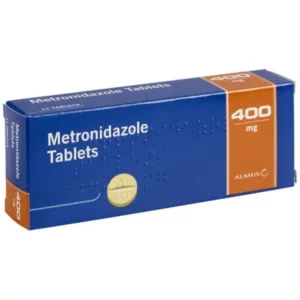
| Drug Name: | Flagyl (Metronidazole), Flagyl ER |
| Tablet Strength: | 200 mg, 250 mg, 400 mg, 500mg |
| Price: | from $0.26 per pill |
| How to Buy | Order Now |
Flagyl, the brand name for metronidazole, is an antibiotic and antiprotozoal medication used to combat various infections in the body. It is effective against certain bacteria and parasites, making it a potent tool in the management of a range of bacterial and parasitic infections. Metronidazole, the active ingredient in Flagyl, is a member of the nitroimidazole class, which is renowned for its antibacterial and antiprotozoal properties.
Flagyl comes in several different forms, such as oral tablets, topical creams, gels, and intravenous injection. The formulation used typically depends on the nature and location of the infection being treated. The oral tablets come in two strengths, 250 mg and 500 mg, and are typically white to off-white in color.
Flagyl is a critical player in the fight against infections and continues to be a mainstay in the therapeutic strategies of many healthcare providers due to its effectiveness and broad-spectrum activity against a variety of pathogens.
HOW DOES FLAGYL WORK?
Flagyl, or metronidazole, exerts its effect by disrupting the DNA structure of the bacteria or parasites it targets. This disruption prevents these microorganisms from growing and replicating, eventually leading to their death. Flagyl is a prodrug, meaning it is metabolized in the body into its active form, which allows it to penetrate the cells of the bacteria or parasites causing the infection.
Once inside the cells, the active form of Flagyl binds to the DNA and RNA of the microorganisms, causing a breakage of their DNA strands and inhibiting their ability to synthesize nucleic acids. This inhibitory action effectively neutralizes the bacteria or parasites, ultimately leading to their death and the resolution of the infection.
INDICATIONS AND USAGE
Flagyl is indicated for the treatment of a variety of conditions caused by susceptible anaerobic bacteria and parasites. It is commonly used to manage:
- Bacterial vaginosis: A condition characterized by an imbalance of bacteria in the vagina.
- Intra-abdominal infections: Such as peritonitis, intra-abdominal abscess, and liver abscess.
- Skin and skin structure infections.
- Central nervous system infections: Including meningitis and brain abscess.
- Lower respiratory tract infections: Including pneumonia, empyema, and lung abscess.
- Endocarditis: An infection of the heart’s inner lining.
- Septicemia: A severe bloodstream infection.
Flagyl is also used to treat sexually transmitted diseases, specifically trichomoniasis, and to prevent infections in people having surgery.
CONTRAINDICATIONS
While Flagyl is a potent antibiotic and antiprotozoal medication, it is not appropriate for everyone. The following contraindications should be noted:
- Patients who have shown hypersensitivity to metronidazole or other nitroimidazoles in the past should not take Flagyl.
- Those with active neurological disorders or a history of seizures, as Flagyl can interact with the central nervous system.
- Patients with blood dyscrasias, as Flagyl can cause blood abnormalities.
- Patients with active liver disease or severe hepatic impairment.
- Pregnant women, especially during the first trimester, as Flagyl can cross the placenta and may pose a risk to the developing fetus.
Before initiating treatment with Flagyl, a comprehensive medical history and examination should be undertaken to rule out any contraindications.
DOSAGE AND ADMINISTRATION
The dosage regimen for Flagyl varies depending on the type and severity of the infection being treated. Dosages should always be individualized and as prescribed by the healthcare provider. The medicine can be taken with or without food, but if stomach upset occurs, it should be taken with a meal.
For instance, when treating bacterial vaginosis, an adult might take 500 mg twice daily for seven days. When addressing trichomoniasis, the typical adult dosage may be 2 grams, taken as a single dose or divided into smaller doses to be taken in one day. Pediatric dosages are usually determined based on weight.
It’s crucial to complete the full course of treatment as prescribed, even if symptoms improve before the medication is finished. Early discontinuation may result in a relapse of the infection.
PRECAUTIONS
When considering treatment with Flagyl, several precautions should be taken into account:
- Patients with liver disease should use Flagyl with caution, as the drug is metabolized in the liver.
- Patients with a history of blood disorders should be monitored closely while taking Flagyl.
- Flagyl may interact with certain other medications, so all current medications should be discussed with the healthcare provider.
- Consumption of alcohol should be avoided during treatment and for at least three days afterward, as severe reactions can occur.
- It is recommended to monitor complete blood counts and liver function in patients with prolonged therapy.
SIDE EFFECTS
Like all medications, Flagyl can cause side effects. These can range from mild to severe and may include:
- Nausea, vomiting, or upset stomach.
- Diarrhea or constipation.
- Headache.
- Loss of appetite or metallic taste in the mouth.
- Dark-colored urine or light-colored stools.
- Dizziness or unsteadiness.
- Skin rash or itching.
More severe but less common side effects include seizures, numbness or tingling in the extremities, and mood changes. If these occur, medical attention should be sought immediately.
STORAGE
Flagyl should be stored at room temperature, away from heat, moisture, and direct light. It should be kept out of reach of children and pets. Do not store in the bathroom, near the kitchen sink, or in damp, humid places. The medication should remain in its original packaging until it is time to take it.
